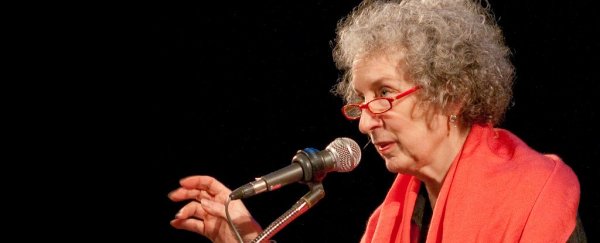The award-winning novelist Margaret Atwood has an important message for the world: unless we empower women, they will continue to bear the brunt of climate change.
"This isn't climate change – it's everything change," Atwood said in a recent speech.
"Women will be directly and adversely affected by climate change."
The remarks were made at last week's Under Her Eye: Women and Climate Change summit held in London and named after The Handmaid's Tale, one of Atwood's most popular books.
The two day event was set up to elevate female voices and perspectives on climate change, gathering together experts from a variety of fields, including arts, politics and science.
"We think this is the first time that the arts, sciences and politics of climate change have been brought together under one roof with a focus on women," Alice Sharp, the director of the arts and science organization Invisible Dust, told The Guardian.
"Women's voices are too rarely heard in discussions of climate change."
For too long, international meetings on climate change have been dominated by men. This is a problem, especially when women in developing countries are some of the most vulnerable to climate change.
"In a lot of the world women are in fact the food producers, and they're also the people who care for their families," Atwood explained in her speech at the event.
"The hotter it gets, the lower your harvest is going to be. If you have a flood, that's going to wipe you out. Women under those situations are going to suffer disproportionately."
As many of Atwood's novels illustrate, in moments of social and political turmoil, women are often the first to suffer. When it comes to climate change this is especially true.
Previous studies, for instance, have linked climate change to female poverty, increased indoor air pollution for women and children, and even domestic abuse.
In fact, United Nation figures reveal that 80 percent of people displaced by climate change are women.
"[Climate change] will also mean social unrest, which can lead to wars and civil wars and then brutal repressions and totalitarianisms. Women do badly in wars – worse than in peacetime," said Atwood before the event.
The parallels that readers can draw between reality and Atwood's novels are no mistake. Several of her post apocalyptic plot lines have explored what the fallout of climate change could look like. Her female characters are almost always on the front lines.
"Women are an essential part of the solution. [We] have different stories to tell based on our different experience," said the UK's Green Party MP Caroline Lucas who was part of the event.
"It's not enough to challenge an old narrative… you have to replace it with a better one."
Still, replacing the old narrative has proven difficult when women are not often given a seat at the table.
For this very reason, Christiana Figueres, the former UN climate chief who oversaw the Paris climate agreement, wants more women negotiating climate policies and solutions.
"Countering this reality is the gritty determination, boundless energy and unwavering spirit of women across the world, whose knowledge, skills and leadership are being harnessed in delivering solutions," she said at the event.
"Climate change is one area in which women have decisively contributed to the progress we are making."
Science AF is ScienceAlert's new editorial section where we explore society's most complex problems using science, sanity and humor.
